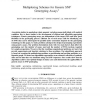Free Online Productivity Tools
i2Speak
i2Symbol
i2OCR
iTex2Img
iWeb2Print
iWeb2Shot
i2Type
iPdf2Split
iPdf2Merge
i2Bopomofo
i2Arabic
i2Style
i2Image
i2PDF
iLatex2Rtf
Sci2ools
103
click to vote
PSB
2004
2004
Multiplexing Schemes for Generic SNP Genotyping Assays
Association studies in populations relate genomic variation among individuals with medical condition. Key to these studies is the development of efficient and affordable genotyping techniques. Generic genotyping assays are independent of the target SNPs and offer great flexibility in the genotyping process. Efficient use of such assays calls for identifying sets of SNPs that can be interrogated in parallel under constraints imposed by the genotyping technology. In this paper, we study problems arising in the design of genotyping experiments using generic assays. Our problem formulation deals with two main factors that affect the genotyping cost: the number of assays used and the number of PCR reactions required for sample preparation. We prove that the resulting computational problems are hard, but provide approximate and heuristic solutions to these problems. Our algorithmic approach is based on recasting the multiplexing problems as partitioning and packing problems on a bipartite g...
| Added | 31 Oct 2010 |
| Updated | 31 Oct 2010 |
| Type | Conference |
| Year | 2004 |
| Where | PSB |
| Authors | Roded Sharan, Amir Ben-Dor, Zohar Yakhini |
Comments (0)

